
10 Nov, 2015
The World’s Most Successful Islamic Economic Forum, And Why It Works
Kuala Lumpur — The World Islamic Economic Forum, held here between Nov 3-5, has evolved into possibly the most unique and successful festival of business, economics, music, arts, ideas and inspiration in the Muslim world. Having just completed its 11th year, the WIEF has grown ten-fold from a paltry 400 delegates at the inaugural forum in 2005 to this year’s total of 4,113 participants from 102 countries, well above the 3,069 delegates from 98 countries projected initially.
The annual gathering of some of the best thinkers, speakers and do-ers in the Islamic world sends a powerful message of the enormous energy, enthusiasm and creativity amongst the world’s 1.5 billion+ Muslims. Said Dr Ahmed Mohamed Ali, President, Islamic Development Bank Group: “The WIEF is undoubtedly one of the finest showcases of the Ummah, an excellent platform for partnership, exchange and knowledge sharing on critical development issues. It is our duty to commend this outstanding achievement and provide support for further success.”
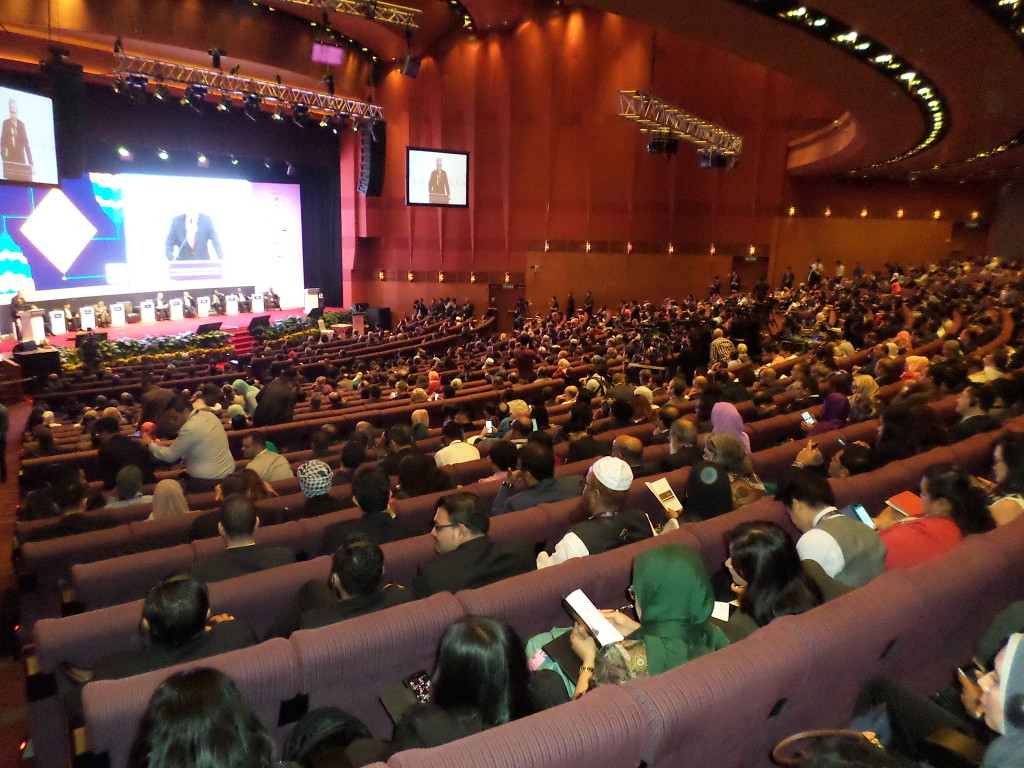
Packed auditorium at the opening ceremony of the 11th WIEF.
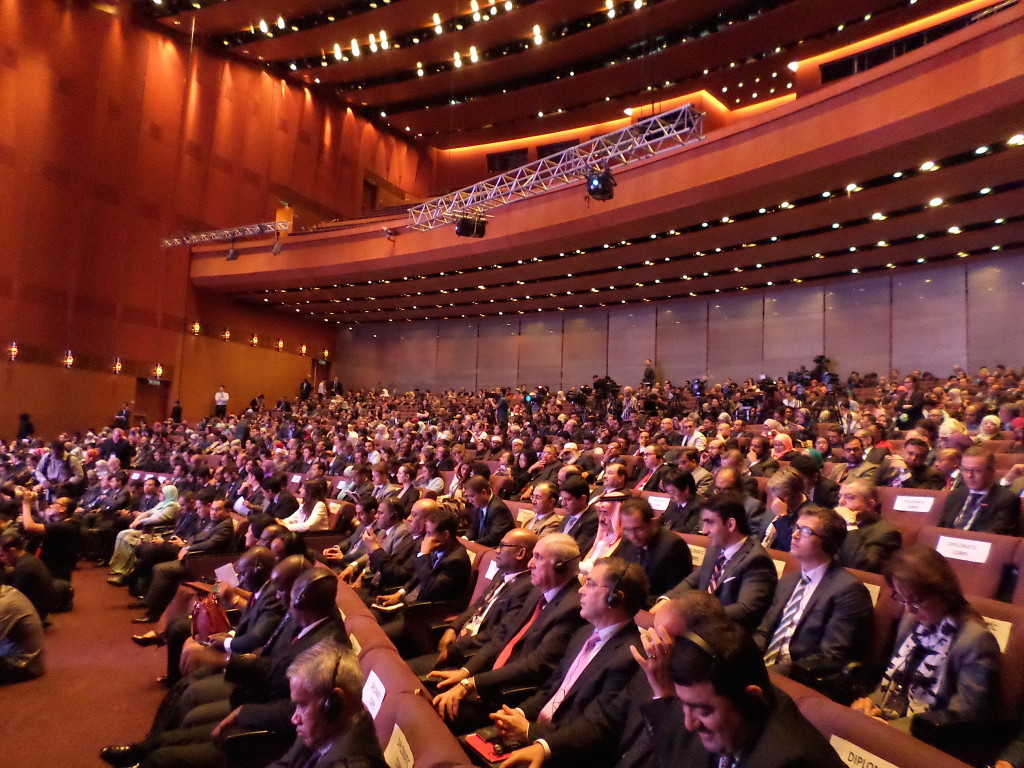
Packed auditorium at the opening ceremony of the 11th WIEF.
Although the name describes it as being both Islamic and Economic, both are misnomers. This year’s event drew delegates from more than 50 non-Muslim nations, including senior leaders of Cambodia and Rwanda. The issues discussed affect all of humanity — poverty, environmental crises, financial turbulence, and more. Advancing women is a top priority, especially in business. The youth have their own forum. Entrepreneurs present business ideas and seek funding. Artists share their mastery of music, calligraphy and design. Professors talk about Islamic management methods. The evenings see alcohol-free music concerts. This year, for the first time, small and medium sized companies were given pride of place.
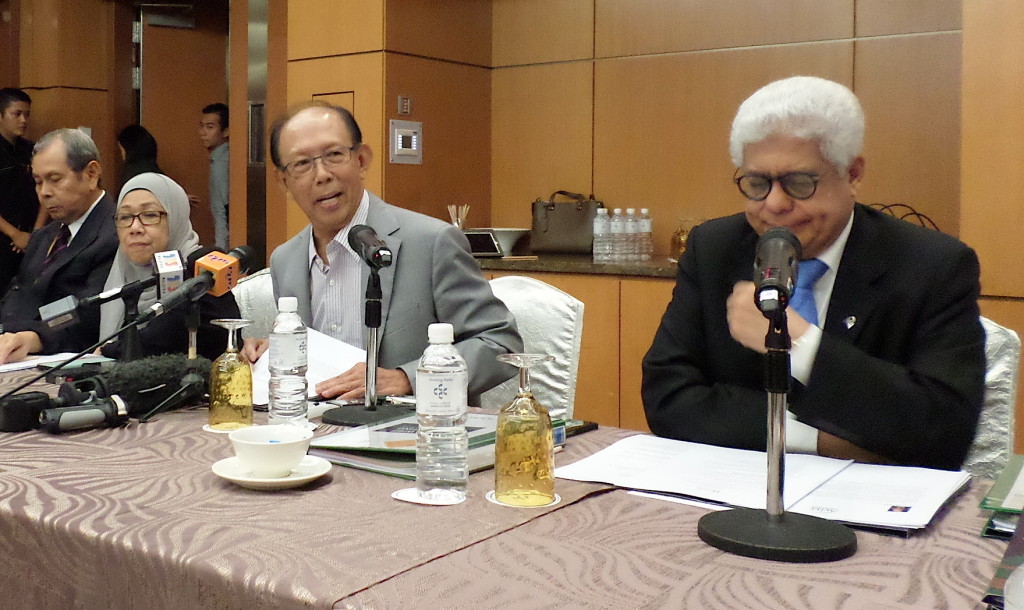
At the opening press conference, WIEF Foundation Chairman Musa Hitan (second right), Tan Sri Ahmad Fuzi Haji Abdul Razak, Secretary General, WIEF Foundation (right), Dato’ Dr. Norraesah Mohamad, Chairman, WIEF Businesswomen Network and Executive Chairman, MyE.G. Services Berhad, Malaysia (second left) and Tan Sri Dr Wan Mohd Zahid Mohd Noordin, Chairman, WIEF Education Trust and Chairman, Management and Science University (MSU) (far left).
WIEF Foundation Chairman Tun (a Malaysian title) Musa Hitam attributes the event’s success to the single-minded focus on building the business, and steering clear of religious and political controversies. Islam does not shun “profit.” Rather, it encourages commerce as a necessary part of attaining balance between the material and spiritual worlds. The only parameters are that wealth must not be ill-gotten nor destructive of the environment and society, and it must be shared with the under-privileged. Those are not just Islamic precepts, but applicable universally.
The atmosphere of unity and productivity at the WIEF makes it a complete antithesis to the Organisation of Islamic Conference, where governmental meetings often end in controversy and bickering. Mr Hitam, a sprightly, media-savvy 81-year-old with a formidable stage presence, is adamant that the WIEF will not fall into that trap. Although patterned along the lines of the World Economic Forum in Davos, and intended to attract a similar calibre of people, Mr Hitam says that it differs from Davos by being non-elitist, and targetted at the “ordinary people.”
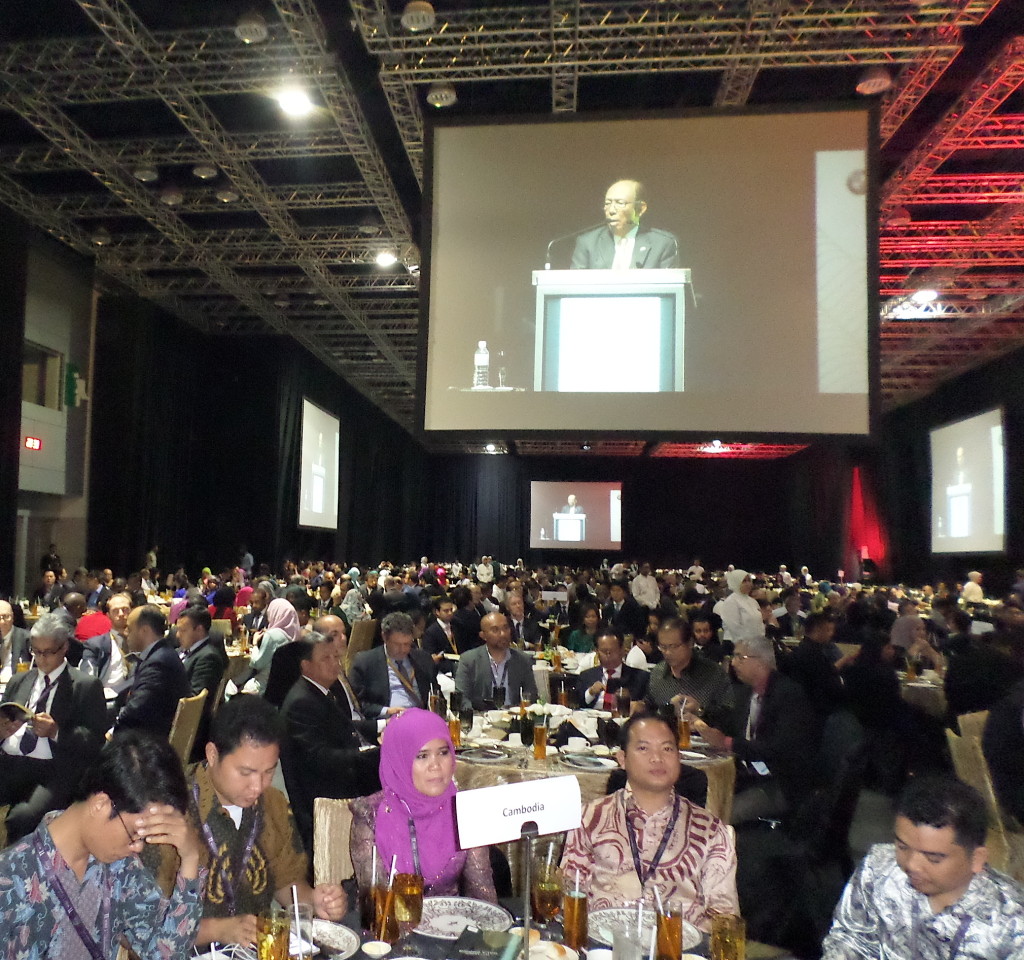
Tun Musa Hitam addressing the gala dinner.
As nothing succeeds like success, the WIEF has attracted extensive financial backing. A cadre of corporations pay from US$50,000 to US$300,000 for a range of gilt-edged sponsorships. Countries are lining up to host both the main event and its growing list of sub-events. Most of the 11 WIEFs have been held in home country Malaysia, but recent years it has convened in Astana, Kazakhstan (2011), London (2013) and Dubai (2014). Next stop: Jakarta, between May 20-22, 2016, alongside the annual meetings of the Islamic Development Bank.
The business potential of the Islamic world is enormous. Straddling nearly all the world’s key sea-lanes, with considerable energy and financial resources, and a population base of millions of Generation X, Islamic countries are estimated to have financial assets of US$$1.81 trillion in 2014, projected to rise to US$3.24 billion in 2020, according to a study by Thomson Reuters.
At the same time, however, there is a reality check. In one of the keynote speeches, Sultan Nazrin Muizzuddin Shah of Perak state, rued the numerous humanitarian crisis facing the world. He said, “The number of displaced people in the world today is higher than in World War II. More than 60 million people are now displaced by conflicts. Of the ongoing humanitarian crises, 90% are in OIC countries. Of the 33 active conflicts today, 31 are in Muslim-majority countries. Yet the majority of humanitarian funding comes from OECD countries.” He said the world at large is facing a crisis of conscience and needs to reset its moral compass in order to deal with future challenges.
The Sultan forgets, however, that the mess is caused by autocratic and corrupt decision-makers and leaders, not the ordinary people. At the grassroots level, it’s a different world. This year’s WIEF scaled new heights, especially in terms of women’s participation. The WIEF Businesswomen’s Network (WBN), claimed to be the largest grouping of businesswomen in the Islamic world, featured some remarkable stories of true grit. Mr. Hitam said the WBN is the most popular component of the WIEF.
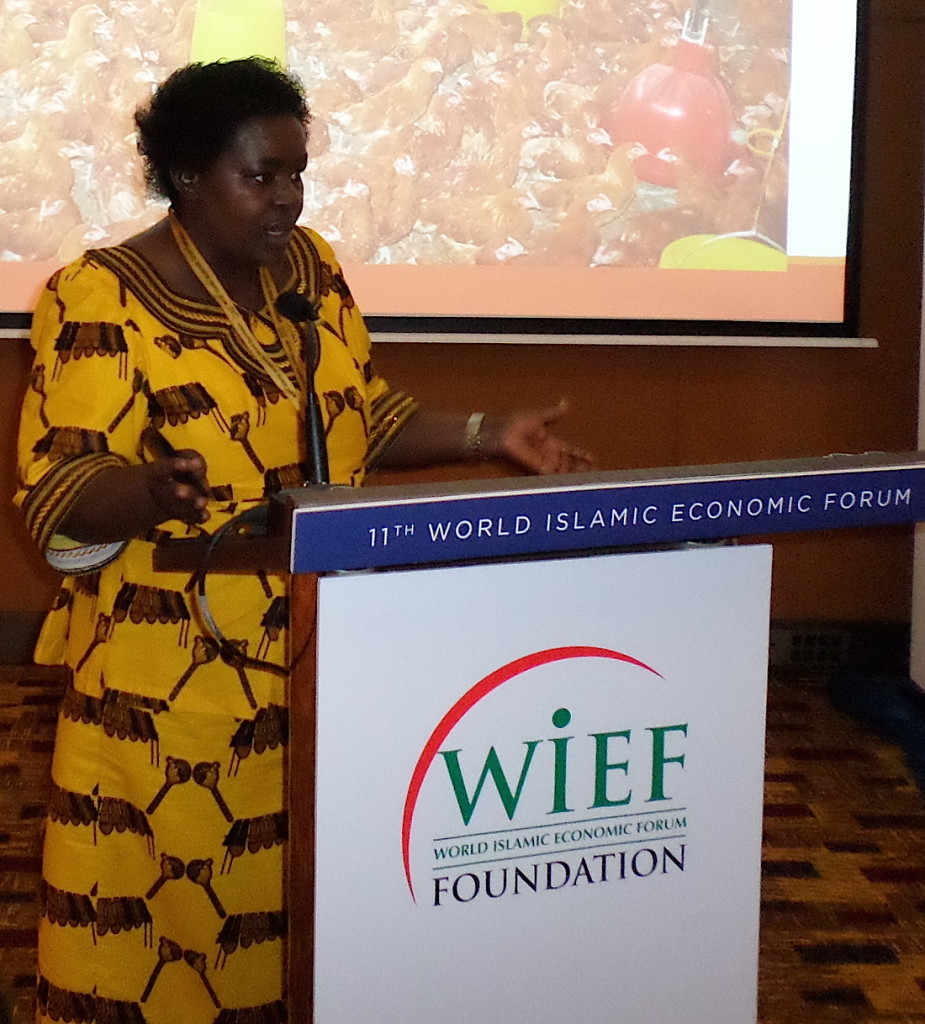
Dr Victoria Kisyombe addressing the WIEF Businesswomen’s Network.
In her opening remarks, Dr Victoria Kisyombe, Founder and Chief Executive Officer, Selfina, Tanzania, narrated how her husband passed away leaving her with a small family. Trained as a vet, she rose from owning one cow to providing micro-finance to thousands of women. Tengku Nurimazon binti Tengku Abdul Wahab, Founder of KU EM Royal Heritage Malaysia, and a mother of four children aged 12 to 21, narrated how she had just started up a herbal biotechnology company using centuries-old processes and products once used solely by Malay royalty.
Shafia Shama, the Bangladeshi proprietor of M/s Shama, a home-décor, fashion and leatherware business, shared her story of starting with only US$50 and navigating “a roller coaster ride with roadblocks at every corner, while maintaining balance between family and work”. A skeptical husband told her, “Your business will not be enough to buy my monthly consumption of cigarettes.” That made her even stronger. Today, she is involved with the national Chamber of Commerce, supports SMEs and wants to become a role model for women entrepreneurs in what is still a male-dominated society. Her advice: “All it needs is will power, hard work and imagination.”
Fatma Elmaawy, Managing Partner, Auto Village, Kenya, built an automotive garage business, also in the face of criticism from her husband who thought she was wasting her time. Operating on the simple business model that car-owners need a reputable garage, she did an online marketing course and built up a website. The business took off. Today, she says, the practical training that is imparted to dozens of young Kenyans makes them better mechanics than theoretical graduates of mechanical engineering institutes.
“We reduce poverty. We just don’t teach them how to fix cars. We skill them, give them practical info, train them in finance, supply management, marketing and administration, so much so that by the time they leave us, they can get jobs or we find jobs for them.” She said women and mothers are natural businesspersons. “We are born nurturers. We give people hope, opportunities. We grow people. That is what we do.”
Hasma Hizbulla Iflal, Director, Hejaaz International School, Sri Lanka, talked about her forward-thinking parents who started an English-language school to help overcome the marginalization of the Muslim minority in Sri Lanka. They had no assets but converted the family home into a school and infused it with their knowledge, experience and passion. It opened in 1994 with only 17 students and 3 teachers and has grown enormously, taking pride in raising a new generation of balanced individuals with a solid Islamic background based on a multi-sectoral curriculum that “prepares them for both this world and the next.”
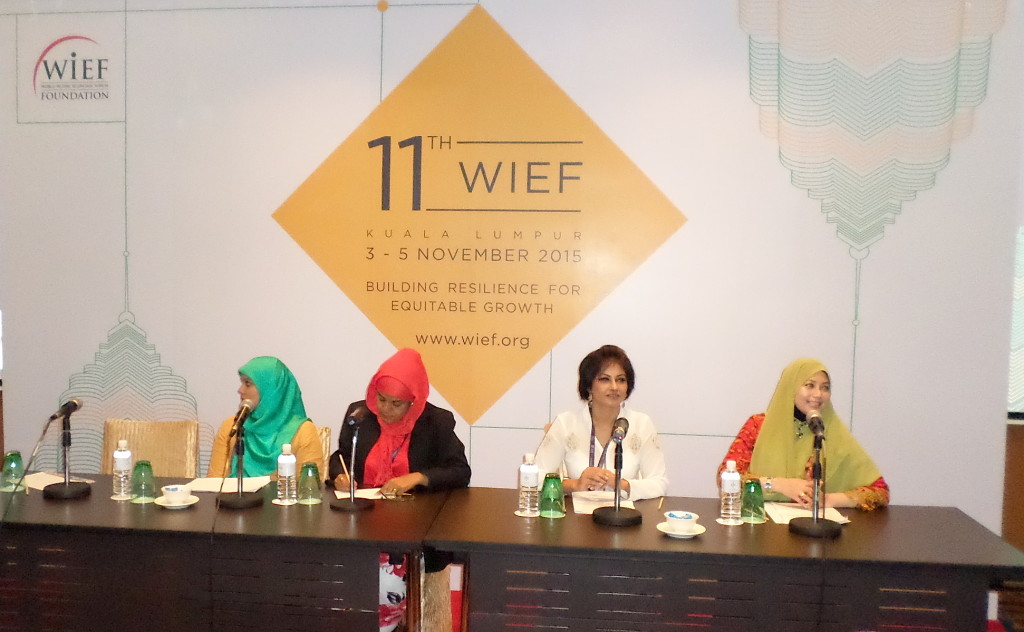
At the Businesswomen’s Network: Shafia Shama, the Bangladeshi proprietor of M/s Shama (second right), Fatma Elmaawy, Managing Partner, Auto Village, Kenya (second left) and Hasma Hizbulla Iflal, Director, Hejaaz International School, Sri Lanka, (left).
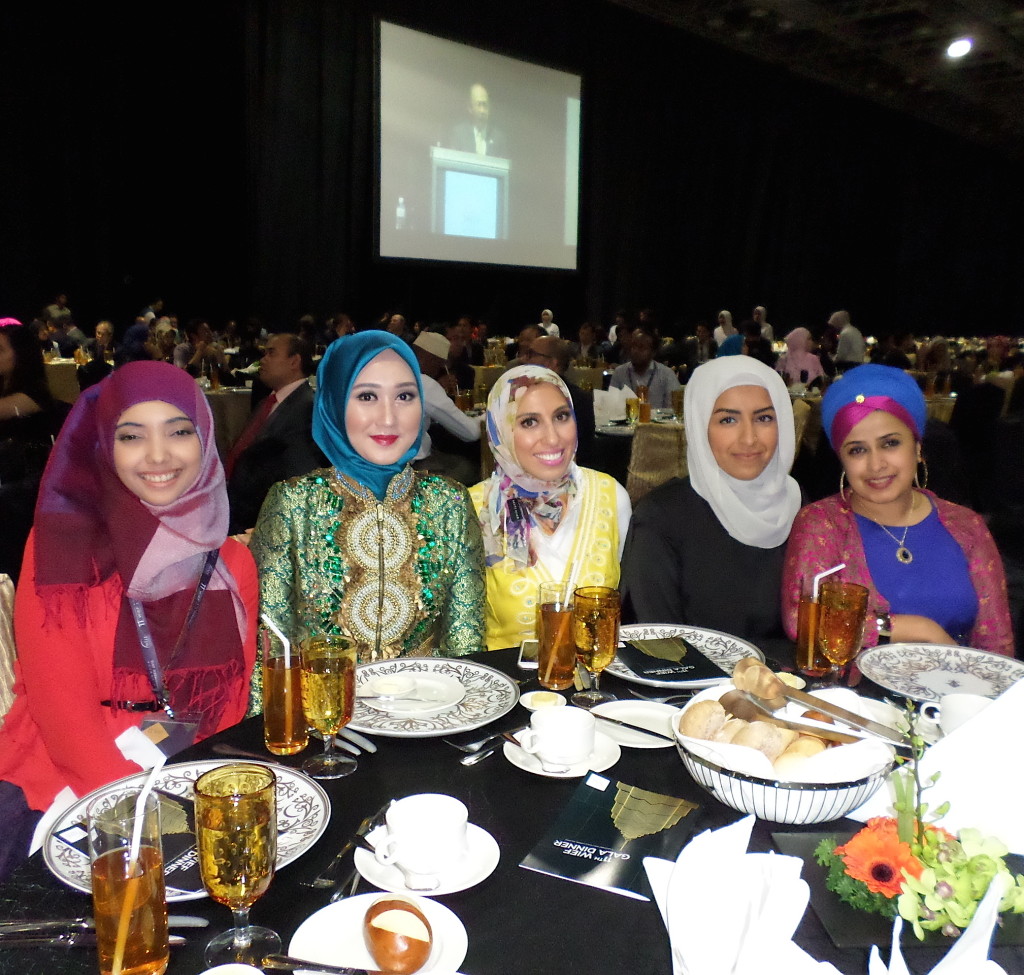
Some of the Islamic fashionistas at the WIEF. Second left is Dian Pelangi, one of Indonesia’s foremost Muslim-wear designers for women. In the centre is Melanie Elturk, CEO and Chief Designer of Haute Hijab UAE, and at extreme right is Tasneem Chopra, chairperson of the Australian Women’s Centre for Human Rights.
There were many more great stories.
Farzana Rahman, a Briton of Pakistani origin and mother of three, was unable to find children’s toys in line with Islamic values in the UK. She decided to create her own dolls. Today, her Desi Doll Company produces “Aamina” and “Yusuf” dolls which impart fun and education about Islamic values in French, Turkish, Malay, English, and Arabic to Muslim children aged 3-6. She was at the WIEF to debut the Malay/Arabic speaking Aamina Dolls and seek distributors in the Malay-speaking world.
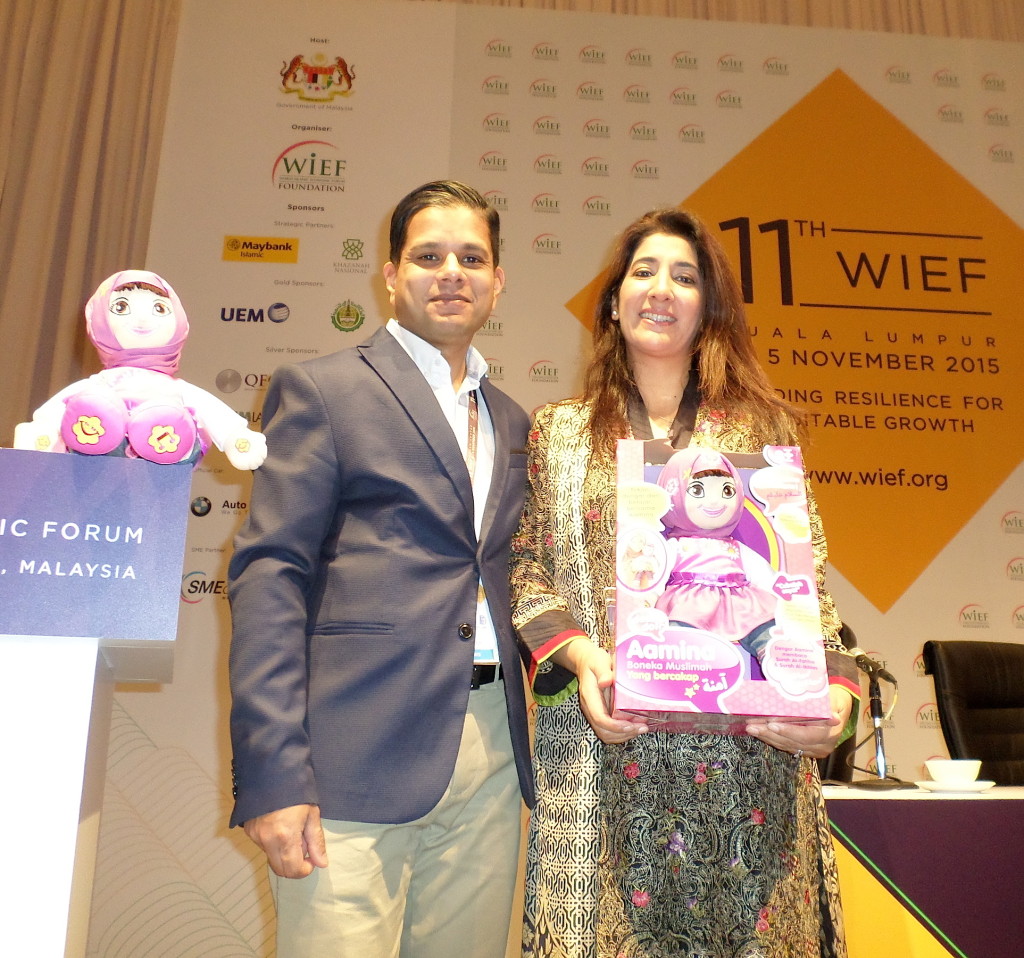
Farzana Rahman and her husband of The Desi Doll Company.
Women musicians also excelled: Noura Mint Seymali, one of Mauritania’s foremost musical emissaries, had delegates in raptures with her rich, resonating voice at the gala dinner. She duets with her husband, who plays bass guitar. Another fine performance was rendered by Suphala, a Tabla player from the U.S., and protégé of the great Indian tabla maestros Ustad Allarakha and Ustad Zakir Hussain. Both were amongst a line-up of 40 artists from 20 countries who performed at the Marketplace for Creative Arts (MOCA Fest), a forum under WIEF umbrella designed to empower young musicians, artists and designers.
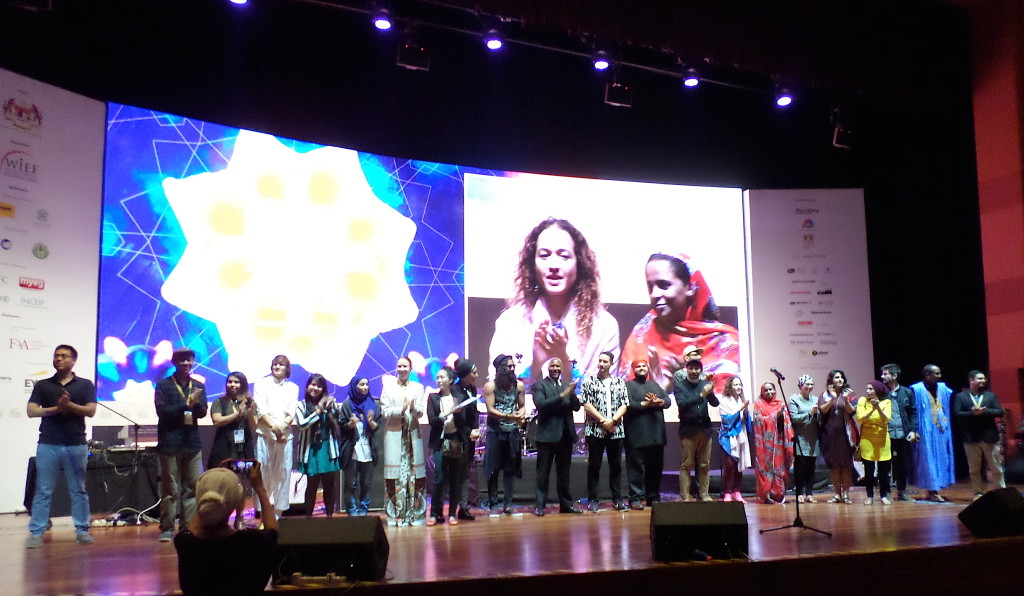
Performers at the evening concert. Seen on the screen are Suphala (left) and Noura Mint Seymali (right).
Delegates also heard Buddhist-majority Thailand’s first Muslim Foreign Minister Surin Pitsuwan talk about walking three kilometres to school every day from his pondok in Southern Thailand, getting a scholarship to study for a doctorate at Harvard and becoming secretary-general of the Association of Southeast Asian Nations. Omar Offendum, a young American of Syrian ancestry, read out heart-breaking poetry about the state of his country.
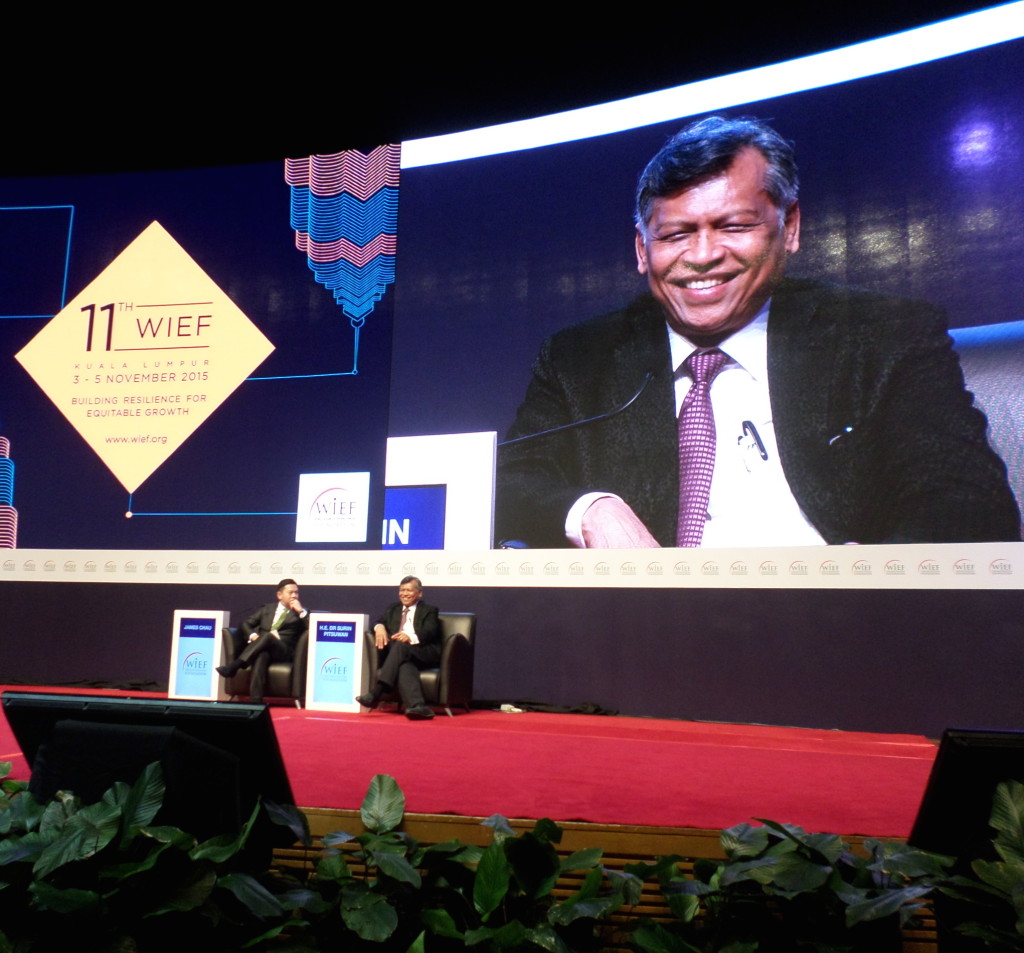
Dr Surin Pitsuwan being interviewed.
International leaders also reached out to the Islamic world. Cambodia’s Deputy Prime Minister Sun Chanthol said: “We see the Islamic world as important partners in our long-term sustainable economic development platform. Cambodia is a nation of economic and religious freedoms and the government has been actively planning and/or putting policies to create closer ties with the Muslim community.”
He said a platform has been created to boost collaboration between the Central Council of Muslims of Cambodia and the Islamic State Federation of Malaysia. Cambodia is also strengthening educational opportunities for Muslim students and is about to set up a body to certify Halal food in the country. Prime Minister Hun Sen recently inaugurated the country’s newest and largest mosque, with the words: “While religion in some countries of the world is divisive, in Cambodia, I can proudly say that we live together peacefully among all races and religious practices.”
Mr Francois Kanimba, Minister of Trade and Industry of Rwanda, noted that his country enjoys cordial relations with a number of Islamic countries, politically and economically. “We have hosted numerous delegations that have to explore investment opportunities and which have yield tangible relationships with a number of our businesses. The current focus on inclusive and equitable growth must sound like an old story to Islamic countries, where your economic practices have been driven by these critical concepts. Whilst I do not admit to being an expert in Islamic economics, I do realise that there is much that we can learn from this model. For instance, the idea of taxing wealth, but not trade, as well as reducing the risk associated with lending, are all ideas that have relevance for my country, as well as others in the sub-Saharan region. As such I look forward learning more about this model during my participation in this conference.”
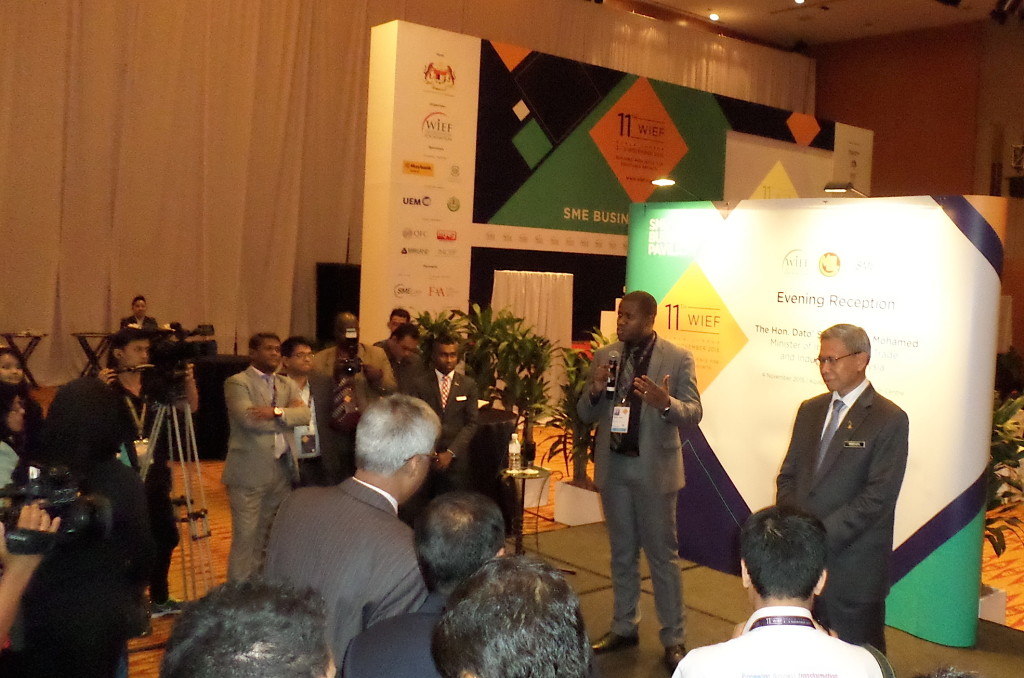
Malaysian Minister of International Trade and Industry. Dato’ Sri Mustapa Mohamed (right) presided at an evening reception at the SME Business Pavilion.
One reason for the high delegate turnout this year was a focus was on small & medium sized enterprises. An SME Business Pavilion was set up to encourage networking amongst SMEs and take advantage of the economic and cultural integration opportunities of the ASEAN Community, due to come into effect at the end of 2015.
Said Dato’ Seri Dr. Ahmad Zahid Bin Hamidi, Malaysia’s Deputy Prime Minister cum Minister of Home Affairs, “SMEs make up more than 95 per cent of total business establishments across ASEAN, and they are generating about 50 to 85 per cent of total domestic employment. In addition, SMEs also make significant contribution to GDP, accounting for 20 to 50 per cent of GDP across ASEAN nations.” The WIEF saw the implementation of a comprehensive Global SME Business Match-Making network to address the barriers and sustainability challenges faced by the SME community.
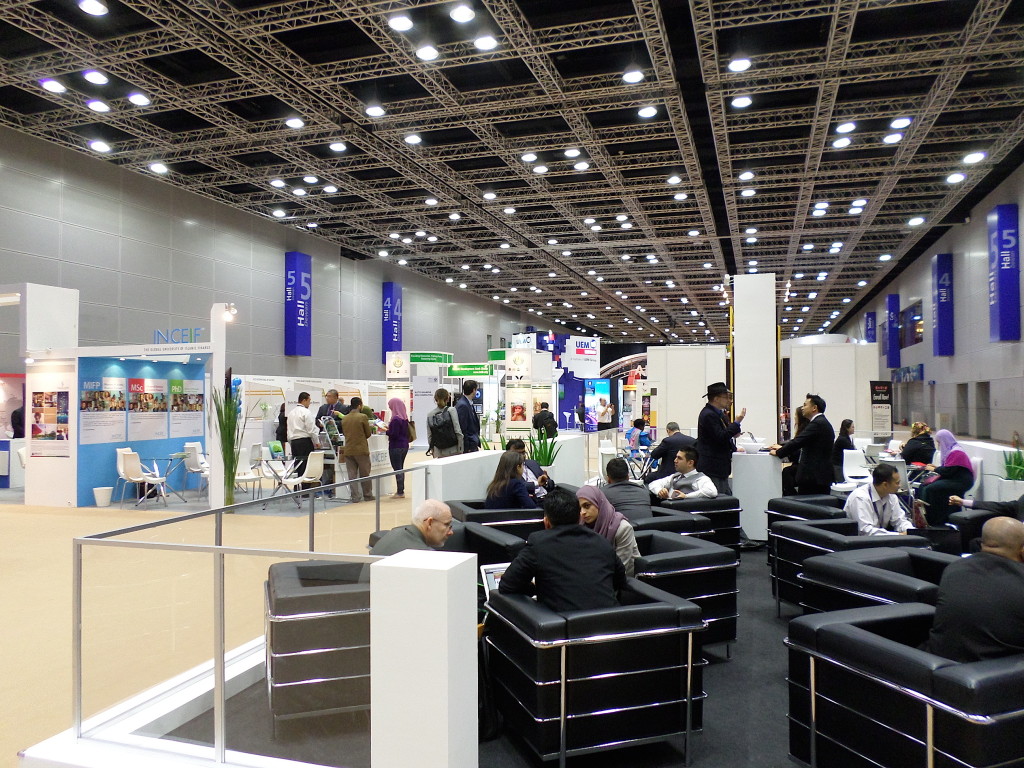
Sponsors and exhibitors had an opportunity to do business.
In his opening remarks, Mr. Hitam had promised delegates an exciting, empowering and colourful event. That’s exactly what they got. For next year’s WIEF in Jakarta between 20-22 May 2016, Indonesian Finance Minister Bambang Brodjonegoro said the Indonesians have proposed that tourism and hospitality be included in the programme for the first time. That will open up long-overdue opportunities for travel & tourism, one of the fastest growing economic sectors in the Islamic world, to become a solid part of the solution.
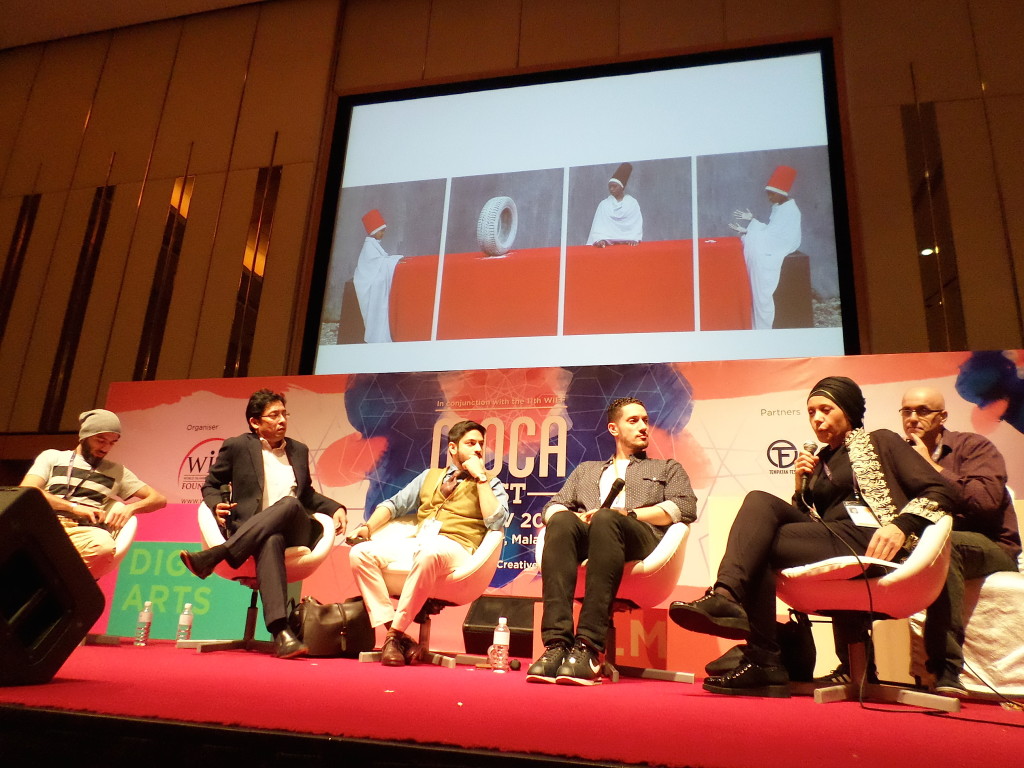
Artists and performers on stage at the MOCA Fest. At right holding the mike is Maïmouna Guerresi, Fine Artist, from Italy, a convert to Islam. Second right is Omar Offendum, Syrian-American hip-hop artist and next to him is Asad Ali Jafri, cultural producer and Global Arts Leader from the U.S.
Indeed, 2016 will be a crucial year for the Islamic world. The well-funded and well-organised Judeo-Zionist war on Islam will move into high gear. As the world strives to cut its usage of fossil fuels, and energy prices remain low, the Islamic world will most likely see its political divisions being exacerbated by diminishing financial resources and looming budget deficits in the Gulf countries. The challenge of providing jobs for the millions of young people will remain the same. The ageing dictators of the Central Asian Republics will be facing a transition. The long-standing Palestinian conflict, the root cause of much instability in the Middle East and globally, will remain unsettled. Seeing opportunities in every crisis, the planners of the war on Islam are set to unleash more divide-and-rule mayhem.
In his remarks, IDB president Ahmed Mohammed Ali said, “In views of the tragic situation that a number of OIC member countries are living today, I would like to suggest to the WIEF to establish a platform for Experts to provide innovative ideas and means to play a more active role in addressing the enormous challenges facing the Ummah today.”
In fact, the entire WIEF itself is a crucible of “innovative ideas”. Although it steers clear of religion and politics, it does allow discussion of serious issues. A roundtable featuring Malaysian academic experts focussed on “Bridging the Leadership Gap in the OIC Countries”. One of the most energetic, intellectually stimulating sessions was a free-for-all debate moderated by Kamarul Bahrin bin Haron, Executive Editor Current Affairs of Malaysia’s Astro Awani media group, on whether the current model of capitalism and “entrepreneurship” is in fact causing many of the global environmental and economic problems.
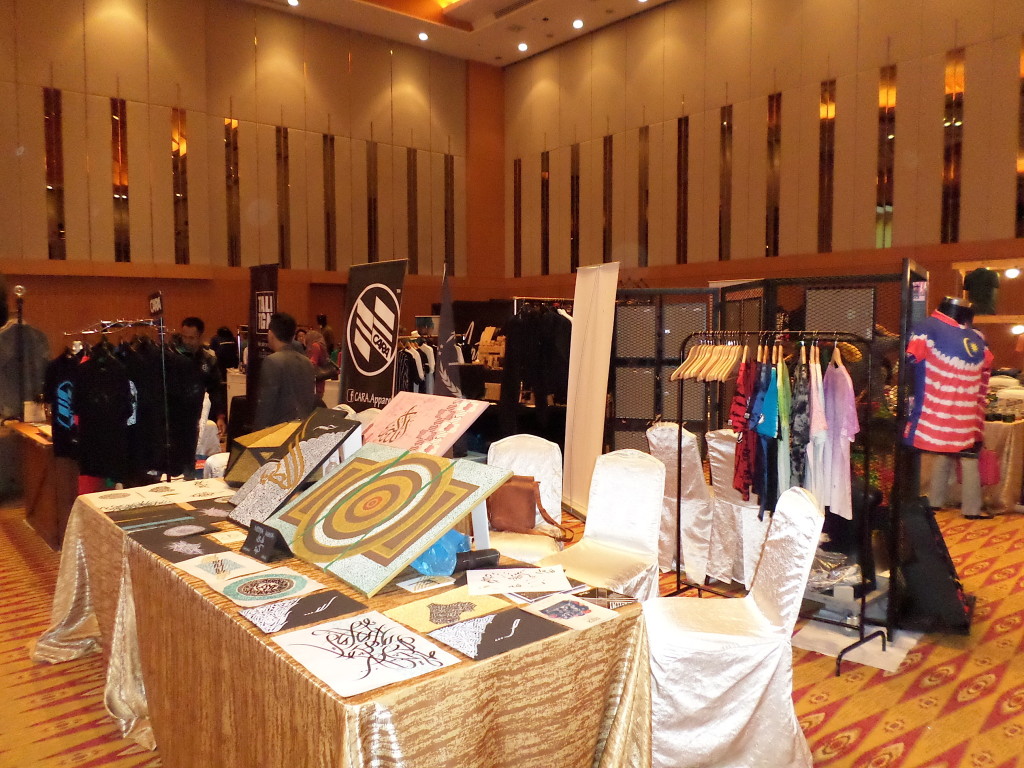
At the Marketplace for Creative Arts, demonstrations of Islamic calligraphy.
In content and creativity, the WIEF sets new standards for Islamic conferences. It sends a strong message to the Islamic political leadership that encouraging the latent energy and creativity within the Ummah is in their interests, as well as that of humanity at large. It also sends a powerful message to the mainstream media to avoid the trap of portraying Islam as a religion of violence and conflict. Most important, it helps promote a better understanding of why the Judeo-Zionists fear a united Islam and seek to weaken and dismember it.
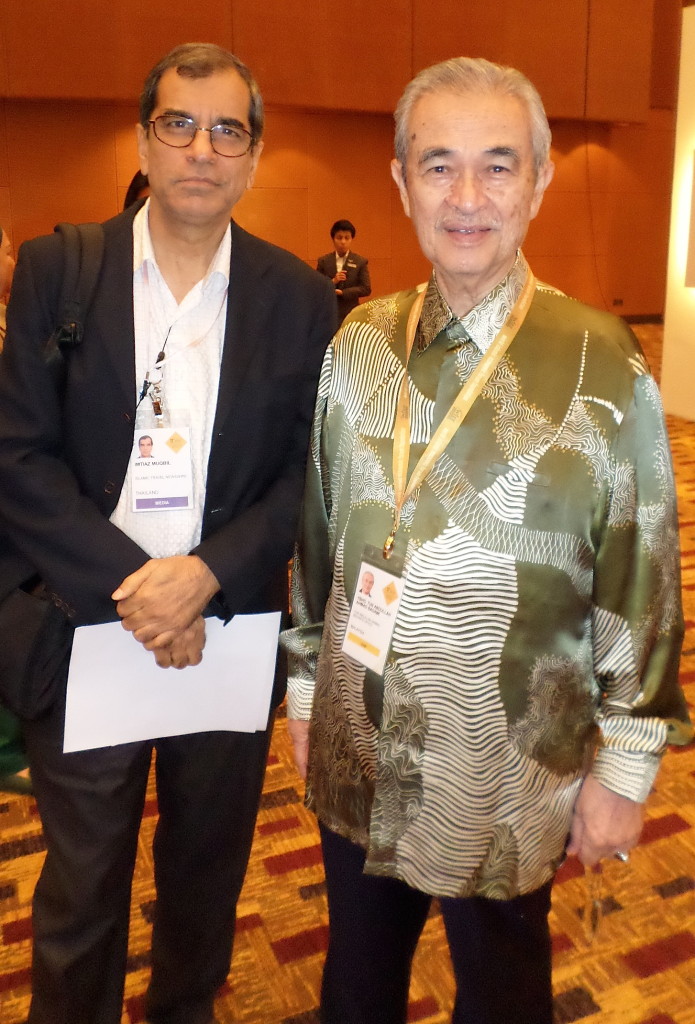
Travel Impact Newswire Executive Editor Imtiaz Muqbil with former Malaysian PM Abdulla Badawi, founder-patron of the WIEF.



Liked this article? Share it!